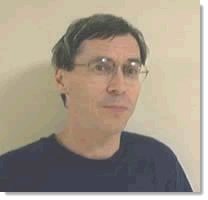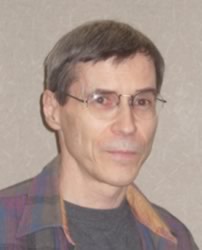information about Craig Rusbult,
to supplement my shorter bio-page:
Although this page still is OK, some updated-and-expanded versions are better, so I recommend reading the first part of this page, until "My PhD dissertation was..." and then moving on to newer bio-pages that are similar, but better. They have a little more about religion (or less), and supplementary pages have a lot more about sports and stories that include sports & more, plus my homepage with links to many more of the pages I've written.
hobbies: learning
and thinking!
also juggling, music — listening to a wide variety (jazz and rock, country
and classical,...) and also playing some — plus dancing (swing and waltz,
contra and square,...) and sports (spectator and participatory).
spectator sports: everything from Olympics to
X-Games, snowboarding & bike racing to whitewater kayak & bullriding; some
of my favorites
are football and basketball, baseball in
the playoffs, and listening to sports radio (in Madison it's ESPN and Big1070).
participatory sports: in the past, lots of basketball
and volleyball, played on championship teams in tennis (for high schools
in
Southern
California),
track & field
(high jumped 6'7" [2 m] and could
dunk),
flag
football
(cornerback in intramurals),
and
slowpitch (left field in intramurals); won U.C. Irvine's Anteater Olympiad (an "octathlon" with 2 runs, 2 jumps, shot put, and sport-skills in baseball, tennis, football, basketball); currently do juggling (video in 2009) and learned unicycling in July 2009; after 5 hours of practice over a period of 2 weeks (learning was more difficult than I expected, it takes a long time and can be dangerous!) I achieved my goal of riding a friend's unicycle more than 50 meters, and (by the grace of God) emerged from the experience with no broken bones.
For
fitness
I stretch and lift, bike (mainly to get places, but once rode a 104-miler just to do
it, and now "ride hills" fast for cross-training),
row
on a machine (once "rowed" a marathon, 42.2 km, in less than 3 hours) and run (5-minute mile as a young adult, and later a half marathon; and in summer 2008 a 7-minute mile [yes, I'm getting slower, but am trying to slow down the rate of slowdown] and another half-marathon [probably my last, unless there is a practical reason to run 13 miles!]) and now I'm mixing in sprints (200 m and 400 m) which is fun because I enjoy the feeling of running fast like a healthy animal. I don't play sports much now, but I do pursue fitness goals (continual and occasional) as described at the end of this page.
It's A Wonderful Life is my favorite movie, partly for its artistic merit (the plot, dialogue, acting,...) but mainly for the message: Each of us affects other people, and life is better if we affect others in a way that is beneficial for them.
As a foundation for living in a way that is beneficial for me and for others, I'm an evangelical Christian, born again and baptized (by my own choice as an adult) in 1983, and my goal is to love and trust God more fully, so I can "live by faith" in the thoughts and actions of everyday life.
major living locations: Iowa, Anaheim, Seattle, and Madison. (also: Newport Beach, U.C. Irvine, Santa Cruz, Eugene, Corvallis, Milwaukee, and Chapel Hill)
FITNESS GOALS — CONTINUAL and OCCASIONAL
CONTINUAL GOALS
I have a list of exercises to do regularly, at home 2-4 times each week (the goal varies for each exercise) plus two workouts at the gym, and this list provides motivation; during weeks when I'm paying attention to the list I usually do the exercises, but I usually don't when I'm ignoring the list. The goal of these exercises is practical, to invest a reasonable amount of time (and with multi-tasking it doesn't require much extra time, it mainly requires discipline) to gain the main benefits of exercise. { This is one application of the 80/20 Principle, with 80% of the health benefits coming from the first 20% of the exercise effort. }
OCCASIONAL GOALS (in my Old History – 1993 to 2010)
Instead of things to do every week, these require more than the usual 20% effort, and they seem to happen once every few years for a couple of months:
In 1993 my uncle in Seattle showed me his drawer of "running event" shirts, and he said I could take anything I wanted. I chose a shirt with beautiful Seattle scenes (Space Needle, Mt Rainier,...) but it said "Seattle Half-Marathon Finisher" and I decided to not wear it until I had actually finished a half-marathon, so (after a couple of 5-mile training runs) I ran the 13.2 miles and it was fairly easy (at 8:24-mile pace) and then I could wear the shirt without being a liar.
In 1997 a friend ran the Madison Marathon, and I thought "I'll probably never do this" but wondered if I could "row" a marathon on the rowing machines (Concept 2) at UW, and after a couple of weeks with extra training I did this in less than 3 hours, not counting four 5-minute breaks, one after each 10 k. A couple of weeks later I rode a 104-miler on bicycle, averaging 16 miles/hour on my mountain bike, not counting two 20-minute breaks. Due to this training I had excellent endurance so I thought "why not try for a 6-minute mile" again (my last had been in 1992 without any training, I just went to the track and ran it) and I would have made this goal (my first try was 6:14 and with a little running practice plus extra effort during the mile, it would have been easy to cut 14 seconds) but the same day I continued running a few 200 m intervals for speedwork, and I was stupid (sitting down between runs, instead of walking & stretching) and my legs were in good shape for rowing & biking but not medium-fast running, and I pulled a hamstring muscle. :<(
A few years later in 2001, I tried again, but didn't have the foundation of endurance work, was older, and I couldn't do it. Sigh. Within a few weeks I was down to 6:31 and was continually getting faster, but I decided it would be difficult (maybe impossible) to cut 32 seconds, and I wasn't motivated to pursue it further.
I tried again in 2004, just to see how low I could go (I knew it wouldn't be under 6 minutes) and after two weeks of training it was below 7:00, then the next few runs got faster & faster down to 6:35, but then I took a trip and this put an end to the training. [note: between 1993 and 2007, all of my timed runs were on indoor tracks, either 1/9 mile banked (1993) or 1/8 mile unbanked (1997 and later)]
Now for some recent [old] history: { I wrote this page in 2010. }
In summer 2007 my goals were practical — to make it through a 4-week trip in Europe with lots of walking and running, without injury or a loss of physical or mental energy — and pre-trip training (by riding fast up hills on bike, along with running, ankle strengthening exercises,...) helped make the trip a great adventure.
distance: In summer 2008, two non-practical "why not see if I can do it" goals were a 7-minute mile and another half marathon. After losing weight (15 pounds) and training, and learning techniques to improve efficiency (like running smoothly at a faster step-tempo to avoid overstriding) I gradually increased speed & endurance (including a few 3-mile runs) and 3 months later had achieved both goals, running a 6:57 mile plus my second half-marathon — which was more difficult than in 1993, even though my pace (8:24 in 1993 versus 9:59 in 2008) was much slower — on UW's outdoor 400 m track. Unfortunately, I didn't begin running with tempo-music (which would have helped improve my running efficiency and performance) until after this, when I began running faster.
speed: Then I got bored with running far (and in the long run it's tough on the body, on joints-back-etc) so in 2009 I began to focus on the joy of running fast. I was sad about my slowdown (like a mile going from 5 minutes to 7 minutes) and thought "maybe I can run a 5-minute mile again if I do it in parts." So I decided to cheat (by running a mile in "wind sprints" of 200 m, with 5-minute rests between each part) and train for speed and endurance, both on the track and by riding a bicycle fast up the Monroe Street Hill, and June 1 my first try at running a mile (in 8 sprints of 200 m, plus 9 meters extra, on UW's 200 m indoor track) was 4:55, achieving my goal. A week later I was even faster, running 200 m in 34 seconds — well, it feels fast for my age, and I would finish only 70 m behind Usain Bolt! Then I thought "maybe I can run a 6-minute mile in quarters (4 x 400 m, plus 9 m) with resting" and a week later I ran 5:30 on the same indoor track, with the first 400 m in 78 seconds. {also, May 2009 was the first time I ever maxed out an upper-body weight machine at the UW Shell}
heat: In mid-June, after the "mile in parts" runs, my goals had become practical again; because I would be visiting hot places (4 weeks in Southern California and Houston) I trained for heat tolerance by running in hot weather, and biking uphill in the afternoon while wearing 5 nylon windbreakers.
more speed: Later, in September/October 2009, for some reason I was running much faster, and my times dropped to under 31 s (for 200 m on UW's outdoor 400-m track) and 73 s (for 400 m on the indoor 200-m track).
health: Now, in 2010 I've returned to simple basic training — by stretching, lifting, rowing, biking, and "mixed runs" for speed and endurance, plus good nutrition and sleeping — so I can be healthy and energetic, ready to live with vigor.

2000 and 2009
